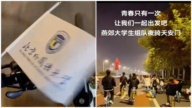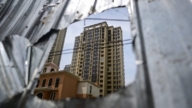【新唐人2011年9月2日讯】中共总理温家宝在最近出版的《求是》杂志撰文说,稳定物价总水准仍是宏观调控首要任务,宏调取向不能变。经济学家认为,大陆通膨已经使老百姓难以承受了,社会处于危险状态,温家宝才有这次表态。中共不改变“藏赋予国”的政策,通胀不能真正解决。
温家宝表示,稳定物价总水准仍然是宏观调控的首要任务,因此要更加注重缓解物价过快上涨这一主要矛盾。
温家宝从年初就强调宏观调控抑制通胀,但是居民消费价格指数CPI仍不断攀升,7月份 CPI为6.5%,创37个月来新高。
经济学家简天伦表示,温家宝之所以强调稳定物价是因为物价太高了,而且还在以每个月超过6%的速度不断推高,危害到中国民生,这也说明中共宏观调控政策的失败。
简天伦(经济学家):“中国的物价上涨危害了老百姓的生存,影响了老百姓的生活,中国的房地产一直是不断大幅上涨,涨幅没有停过。虽然中国从去年十月份以来利息加了五次,而且银行储备金率提高了9次,但并没有取得什么效果。”
简天伦认为,不改变人民币汇率,光提高利率和储备金比率的宏观调控,根本不可能改变通胀。
简天伦:“它现在所采取的办法没有达到很好的效果,原因在于第一这是累积的,第二是人民币长期以来低估造成的,累积下来十几年造成的。中国出口一直都是顺差,而且非常大,外汇储备一直都是不断的扩大。又要保持人民币汇率的低估不变,那么就把人民币充斥国内市场,所以通货膨胀是不可避免的。”
今年以来,与百姓生活相关的食品、蔬菜涨幅更大。像猪肉,5月份比去年同比涨了40%,而7月份比6月份一个月涨幅就达11.7%。
经济评论专家杰森分析认为,目前,食品的通胀使得占社会大多数的中低层老百姓生活水准不断下降,这对经济增长超过10%的社会来说,绝对是一个危险的状态。但食品上涨最大的原因是中共盘剥的太厉害。
杰森:“这些涨价的因素要么是中共政府税收的方式,或者是中共央企,像石油能源、电力、水利等等中共控制的这些企业拿钱。换句话说,其实推动整个食品价格上涨的处处能看到中共的影子。”
温家宝在文章中特别强调,坚定不移的把房地产市场调控政策落到实处、确保见到实效。
对此,杰森表示,房价就像一颗剧毒的毒草,它能把经济发展的各种“苗”都能毒死,所以中共一直强调控制房价,但目前二线城市房价还在超过两位数的速度上涨。说明中共的政策到了地方,也会被架空。
杰森:“中共不会实实在在的紧缩他的政策,即使中央想紧缩,地方也不会的,地方政府会想尽一切办法保证它的财政的。”
另外,经济学家草菴居士认为,利益集团主导了中国大陆整个国家走“藏赋予国”而不是“藏赋予民”的模式,中国内需得不到培育,本身蕴藏危机。他说,随着美国经济衰退,走向二次探底,中国也必将受到更加严重的影响,物价更高。国际经济形式的动荡,让走出口导向的中国经济,将逐渐走向崩溃。
新唐人记者梁欣、宋风、萧宇采访报导。
=====
Stabilizing Prices First Priority
Chinese Premier Wen Jiabao wrote recently
in Seeking Truth magazine,
that the stabilization of general price levels remains
the primary task of macroeconomic regulation and control,
and cannot be changed. Economists believe that inflation
has reached a point hard to bear for people in the mainland,
society is in danger, so Wen showed his stand.
If the Chinese Communist Party (CCP) does not change
its policy of ‘national wealth,’ inflation cannot be solved.
Wen said to stabilize the general price level remains
the primary task of macroeconomic regulation and control,
and therefore he should pay more attention
to prices rising too fast.
Wen stressed macro-control of inflation since early 2011,
but the consumer price index (CPI) is still rising.
In July, CPI was 6.5%, becoming the highest
in the past 37 months.
Economist Jian Tianlun said that Wen stressed
price stabilization because prices are too high,
and are increasing at a rate of more than 6% per month,
harming the Chinese citizens.
This also shows the failure of the macro-control policy.
Jian Tianlun (Economist): “China’s inflation is detrimental to
the survival of the people, affecting lives of ordinary people.
China’s real estate prices have been at a sharp rise,
which never stopped.
Although the Chinese interest rates have increased five times
since last year, and bank reserve ratio increased nine times,
they did not achieve any results."
Jian Tianlun: “Without changing the RMB exchange rate,
it is impossible to change the inflation
by rising interest rates and reserve ratios.”
Jian Tianlun: “The approach taken had not achieved
good results, because firstly it is cumulative.
Secondly, it is a result of RMB having long been
undervalued, over 10 years now.
Chinese exports have been a surplus, and foreign exchange
reserves have been continuously expanded.
If RMB is kept undervalued, the RMB will flood
the domestic market, so inflation will be inevitable.”
In 2011, food and vegetable prices rose even more sharply.
Pork rose 40% in May, compared to that in 2010,
and rose another 11.7% in July, compared to June.
Economic expert Jason Jie believes that food inflation leads
to lower living standard of middle and low levels of society,
as it is dangerous for a society to have
an economic growth of more than 10%.
But the biggest reason for the rise in food prices
is CCP’s various ways of exploitation.
He said, the price rising factor is either in the way
of tax, or from the CCP controlled companies,
like those in oil and energy, water and electricity industries.
The CCP pushes consistently the prices higher in all sectors.
Wen emphasized that the real estate market
regulation and policies should be executed firmly
to ensure achieving tangible results.
Regarding Wen’s remarks, Jie stressed that high housing prices
are like a highly toxic weed,
which can kill all sprouts in economic development.
So the CCP has always stressed to control house prices,
but house prices in second-tier cities are still increasing
at a double-digit rate. It shows the CCP’s policies
will become a figurehead.
He believes that the CCP will not tighten its policies,
even though CCP central wants to, the local will not do it.
Local governments use every mean to secure their finances.
Economist Cao’an Jushi said that interest groups in China
led to a ‘wealthy country’ instead of ‘wealthy people’ model.
Chinese domestic demand was not nurtured. He said, along
with U.S.’ recession hitting rock bottom for a second time,
China is bound to be more seriously affected,
and prices will rise.
International economic turmoil will make the Chinese
export-oriented economy gradually heading toward collapse.
NTD reporters Liang Xin, Song Feng and Xiao Yu




























